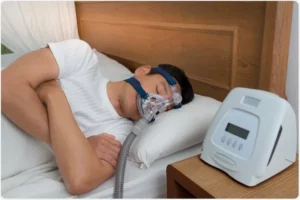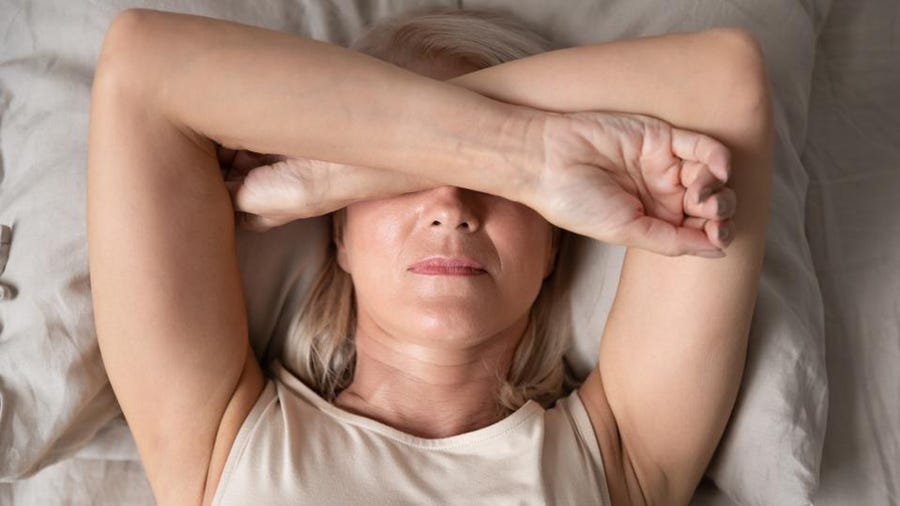Do you often feel exhausted during the day, even after a full night’s sleep? Have you ever had a breathing problems while sleeping? If so, you may be one of the millions of people who suffer from sleep apnea. This is a condition that causes you to stop breathing for short periods of time while you are asleep. Not only can this lead to fatigue and other health problems, but it can also be quite dangerous. In this blog post, we will discuss some solutions for breathing better while sleeping.
Contents
What Are Breathing Problems While Sleeping?

Breathing Problems while sleep is generally caused by a sleep disorder or condition called sleep apnea. Sleep apnea is a condition in which you stop breathing for short periods of time while you are asleep. This can happen several times throughout the night and can lead to fatigue, headaches, and other health problems.
People with sleep apnea often snore loudly, and they may also gasp or choke during the night. As a result, they often wake up feeling exhausted. Sleep apnea can lead to several other health problems, including high blood pressure, heart disease, and stroke.
Types Of Sleep Apnea
These are the main types of sleep apnea:
- Obstructive sleep apnea: This is the most common type of sleep apnea. It happens when your airway becomes blocked while you are sleeping.
- Central sleep apnea: This type of sleep apnea occurs when your brain does not send signals to your muscles to breathe.
- Mixed sleep apnea: This is a combination of both obstructive and central sleep apnea.
These are the most common types of sleep apnea, but there are also other less common types.
What Causes Breathing Problems While Sleeping?

There are a number of different factors that can contribute to breathing problems while sleeping, including:
- Being overweight: Fat deposits around the neck can narrow the airway and make it more likely to collapse during sleep.
- Having large tonsils or a large tongue: These can block the airway.
- Nasal congestion: This can make it difficult to breathe through the nose.
- Smoking: This can irritate the airway and make it more likely to collapse.
- Family history: Sleep apnea often runs in families.
- Age: Sleep apnea is more common in older adults.
- Neck circumference: People with a neck circumference of 17 inches or more are more likely to have sleep apnea because they have a narrower airway.
- Use of sedatives: These can relax the muscles in the throat and make it more likely for the airway to collapse.
- Sleep position: People who sleep on their backs are more likely to have sleep apnea because this position allows gravity These can relax the muscles in the throat and make it more likely to collapse.
- Alcohol use: This can relax the muscles in the throat and make it more difficult to breathe.
- Medical conditions: Conditions such as heart failure, kidney failure, and diabetes can contribute to sleep apnea.
There are a lot of factors that contribute to sleep apnea. To treat it, you need to find out what is causing it.
Symptoms
Several different symptoms can be associated with sleep apnea, including:
- Loud snoring: This is often the first symptom that people notice.
- Gasping or choking during sleep: This happens when the airway becomes blocked and you stop breathing.
- Waking up feeling exhausted: This is because you are not getting enough oxygen while you are asleep.
- Headaches: This can be a result of the lack of oxygen to the brain.
- Memory problems: This can also be a result of the lack of oxygen to the brain.
- Irritability: This can be caused by the fatigue that is associated with sleep apnea.
These symptoms can have a significant impact on your quality of life. If you are experiencing any of these symptoms, it is important to see your doctor.
Effects
There are a number of different effects that sleep apnea can have on your health, including:
- Fatigue: This is one of the most common effects of sleep apnea. When you are not getting enough oxygen, your body can’t function properly and you can feel tired during the day.
- Type-2 diabetes: This is a condition that can be caused by sleep apnea. When you stop breathing, your body doesn’t get the oxygen it needs and this can lead to diabetes.
- High blood pressure: This is another condition that can be caused by sleep apnea. When you stop breathing, your blood pressure can rise and this can lead to other health problems.
- Heart disease: This is a serious condition that can be caused by sleep apnea. When you stop breathing, your heart doesn’t get the oxygen it needs and this can lead to heart disease.
- Stroke: This is a very serious condition that can be caused by sleep apnea. When you stop breathing, the lack of oxygen can cause a stroke.
- Metabolic syndrome: This is a condition that can be caused by sleep apnea. When you stop breathing, your body doesn’t get the oxygen it needs and this can lead to metabolic syndrome. this includes high blood pressure, high cholesterol, and diabetes.
- Depression: This is a condition that can be caused by sleep apnea. When you are not getting enough oxygen, it can lead to depression.
- Anxiety: This is a condition that can be caused by sleep apnea. When you are not getting enough oxygen, it can lead to anxiety.
- Liver problems: This is a condition that can be caused by sleep apnea. When you are not getting enough oxygen, it can lead to liver problems.
These problems could have a serious impact on your physical and mental health. It is important to see your doctor if you are experiencing any of these effects.
How Is It Diagnosed?

Your doctor will ask about your medical history and symptoms. They will also do a physical exam. You may also need to have a sleep study. This is a test that is done overnight in a sleep lab. It is to check if you have any breathing problems while sleeping.
During the sleep study, your breathing, heart rate, and brain waves will be monitored. This will help to find out if you have sleep apnea.
Your doctor may also recommend a home sleep test. This is a test that you can do at home. You will need to wear a special device that will monitor your breathing. This will make it easier to detect your breathing problems while sleeping.
Your doctor will use the results of your sleep study to diagnose sleep apnea. They will also use these results to find the best treatment for you.
After the diagnosis of sleep apnea, the next thing to do is find out what is causing it. If the cause is known, It is easier to find the treatment.
Treatment

There are a number of different treatments that can be used to treat sleep apnea, including:
- Continuous positive airway pressure (CPAP): This is a treatment that uses a machine to help you breathe. The machine will force air into your lungs and this will keep your airway from collapsing.
- Oral appliance: This is a device that you wear in your mouth while you sleep. It helps to keep your airway open.
- Dental devices: This is a treatment that can be used to help keep your airway open. Devices like this can be custom-made for you by your dentist. For example, you might have a device that goes over your teeth or one that goes under your tongue.
- Pilates, and Tai Chi: These exercises can help to improve your sleep and reduce the symptoms of sleep apnea.
- Yoga: This is an exercise that can help to improve your sleep and reduce the symptoms of sleep apnea.
- Acupuncture: This is a treatment that can be used to help reduce the symptoms of sleep apnea.
There are several other things you can do to minimize the symptoms of sleep apnea and get better sleep. Some simple changes in your lifestyle can make a big difference.
Self-help

You can also try some home remedies for sleep apnea, including:
- Losing weight: This can help to reduce the pressure on your airway.
- Sleeping on your side: This can help to reduce the pressure on your airway.
- Avoiding alcohol: This can help to relax your muscles and reduce the risk of sleep apnea.
- Avoiding smoking: This can help to reduce the inflammation in your airway.
These are just a few of the different treatments that are available for sleep apnea. If you think you may have sleep apnea, it is important to see a doctor. Sleep apnea is a serious condition and it can lead to other health problems. Treatment can help to improve your sleep and reduce the risk of other health problems.
Medication
There are a number of different medications that can be used to treat sleep apnea, including:
- Antidepressants: These can help to reduce the symptoms of sleep apnea like snoring and gasping for breath. These include selective serotonin reuptake inhibitors (SSRIs), tricyclic antidepressants (TCAs), and monoamine oxidase inhibitors (MAOIs).
- Benzodiazepines: These can help to relax your muscles and reduce the risk of sleep apnea. These include, alprazolam (Xanax), diazepam (Valium), and lorazepam (Ativan).
- Anti-anxiety medication: This can help to relax your muscles and reduce the risk of sleep apnea like snoring and gasping for breath. These include buspirone (Buspar), hydroxyzine (Vistaril), and trazodone (Desyrel).
- Stimulants: These can help to keep you awake and reduce the risk of sleep apnea. These include amphetamines, caffeine, and methylphenidate (Ritalin).
These are just a few of the different medications that are available for sleep apnea. If you think you may have sleep apnea, it is important to see a doctor. Sleep apnea is a serious condition and it can lead to other health problems. Treatment can help to improve your breathing problems while sleeping.
Surgery
In some cases, surgery may be necessary to treat sleep problems or breathing problems while sleeping.
- Uvulopalatopharyngoplasty (UPPP): This surgery is for treatment of sleep apnea. It involves removing the uvula and part of the soft palate.
- Laser-assisted uvulopalatoplasty (LAUP): This surgery is to resolve breathing problems while sleeping. It involves using a laser to remove the uvula and part of the soft palate.
- Maxillomandibular advancement (MMA): This surgery is used to treat sleep apnea. It involves moving the upper and lower jaws forward.
These are just some of the surgeries that can be used to treat sleep problems. These surgeries are considered only for severe cases of sleep apnea. If you think you may have sleep apnea, it is important to see a doctor. Sleep apnea is a serious condition and it can lead to other health problems. Treatment can help to improve your sleep and reduce the risk of other health problems.
When To Seek Help?
Sleep apnea is usually manageable without professional help. However, there are some cases where you may need to see a doctor or sleep specialist.
You should see a doctor if:
- You snore loudly and you feel tired during the day.
- Your partner tells you that you stop breathing during the night.
- You have high blood pressure or other health problems.
- You are having trouble concentrating or you are having memory problems.
- You have mood swings or you are irritable.
- You have headaches in the morning.
- You are falling asleep during the day.
If you think you may have sleep apnea, it is important to see a doctor. Sleep apnea is a serious condition and it can lead to other health problems. Treatment can help to improve your sleep and reduce the risk of other health problems.
Conclusion
Sleep apnea is a common but often undiagnosed sleep disorder where breathing repeatedly stops and starts during the night, preventing deep and restful sleep. It usually occurs when the throat muscles relax and block the airway during sleep. I But if you still continue to have breathing problems while sleeping you should consider going to a sleep specialist. A sleep specialist can help you find the best treatment for your sleep apnea. If you found this information helpful, please share it with others who might benefit from it.
Therapy Mantra is the leading provider of mental health services around the globe. With a team of highly qualified and experienced mental health professionals, we are committed to providing the best possible care to our patients. Therapy Mantra is always here to help you improve your quality of life! You can also book an online therapy session or download our free Android or iOS app.


